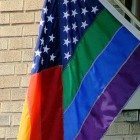August 27, 2011; Source: The Arab American News | Although Muslims have lived in America since before it became the United States, many of us share misconceptions about our Muslim neighbors. The more sinister of these ideas have propagated, in large part, due to the attacks on September 11 a decade ago. The misunderstandings are exacerbated by tough economic times, increasing numbers of non-white Americans, and greater diversity in culture and religion.
Journalists are no different from most of us. They are faced with their own misconceptions and biases as they try to cover issues involving Muslim communities. Many don’t have any background or experience with the faith tradition, and they often lack access to sources who have first-hand knowledge of Islam.
Last week, with funding support from the McCormick Foundation, the Middle Tennessee State School of Journalism hosted a conference in Nashville entitled “Covering Islam in the Bible Belt.” The meeting was attended by journalists from 22 different media outlets including the Miami Herald and the Associated Press.
Conference participants attended presentations on a range of topics, including how to “Acknowledge Your Bias and Improve Your Coverage” and the “First Amendment, Religious Freedom and National Security.” They engaged in meaningful discussions, asking a wide variety of questions and learning more about the issues most pertinent to American Muslims.
Sign up for our free newsletters
Subscribe to NPQ's newsletters to have our top stories delivered directly to your inbox.
By signing up, you agree to our privacy policy and terms of use, and to receive messages from NPQ and our partners.
The conference did not escape controversy—not surprising given that opposition to a proposed mosque in nearby Murfreesboro has generated national attention. On the second night, a televised public forum entitled “Will Islamic Law Ever Be a Part of the U.S. Legal System?” turned ugly when some of the audience members began loudly disrupting the panel. The outbursts reportedly came from supporters of one of the panelists, Bill Warner, the founder of the Center for the Study of Political Islam. Warner depicts Islam in his writings and videos as a violent movement.
Warner’s followers accused the other panelists, Umbreen Bhatti of the University of Michigan and Saleh M. Sbenaty, a Muslim engineer from Middle Tennessee State University, of lying. Bhatti had tried to explain the compatibility of Islam with the U.S. Constitution and Sbenaty related his experiences as a Muslim in Tennessee.
The disruption at the forum underscores the need for even more events that seek, as this one did, to educate Americans about Islam and their American Muslim neighbors. It also puts a spotlight on the fear, ignorance and irrationality some people choose to indulge in. As the nation becomes more diverse, pluralistic and fragmented, it will be a challenge to live up to the nation’s original motto E Pluribus Unum—“Out of Many, One.”—Erwin de Leon













